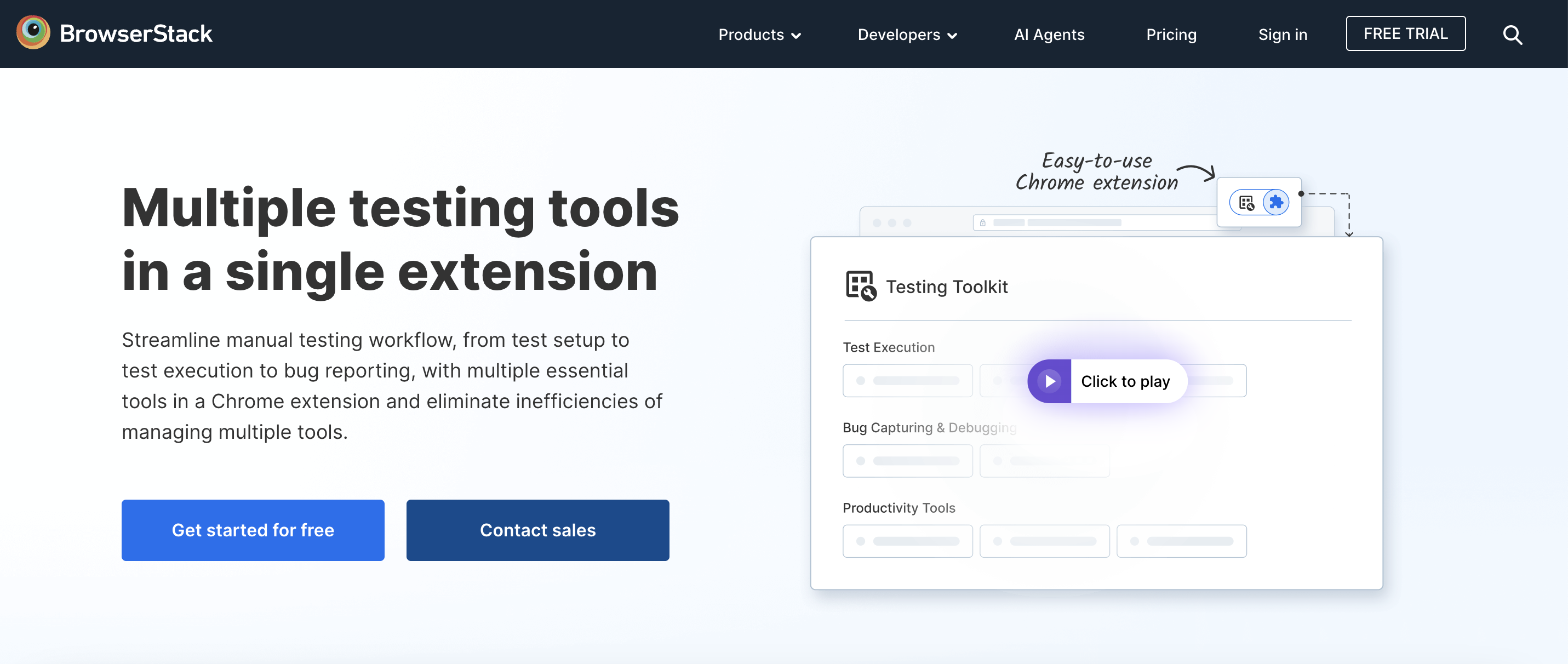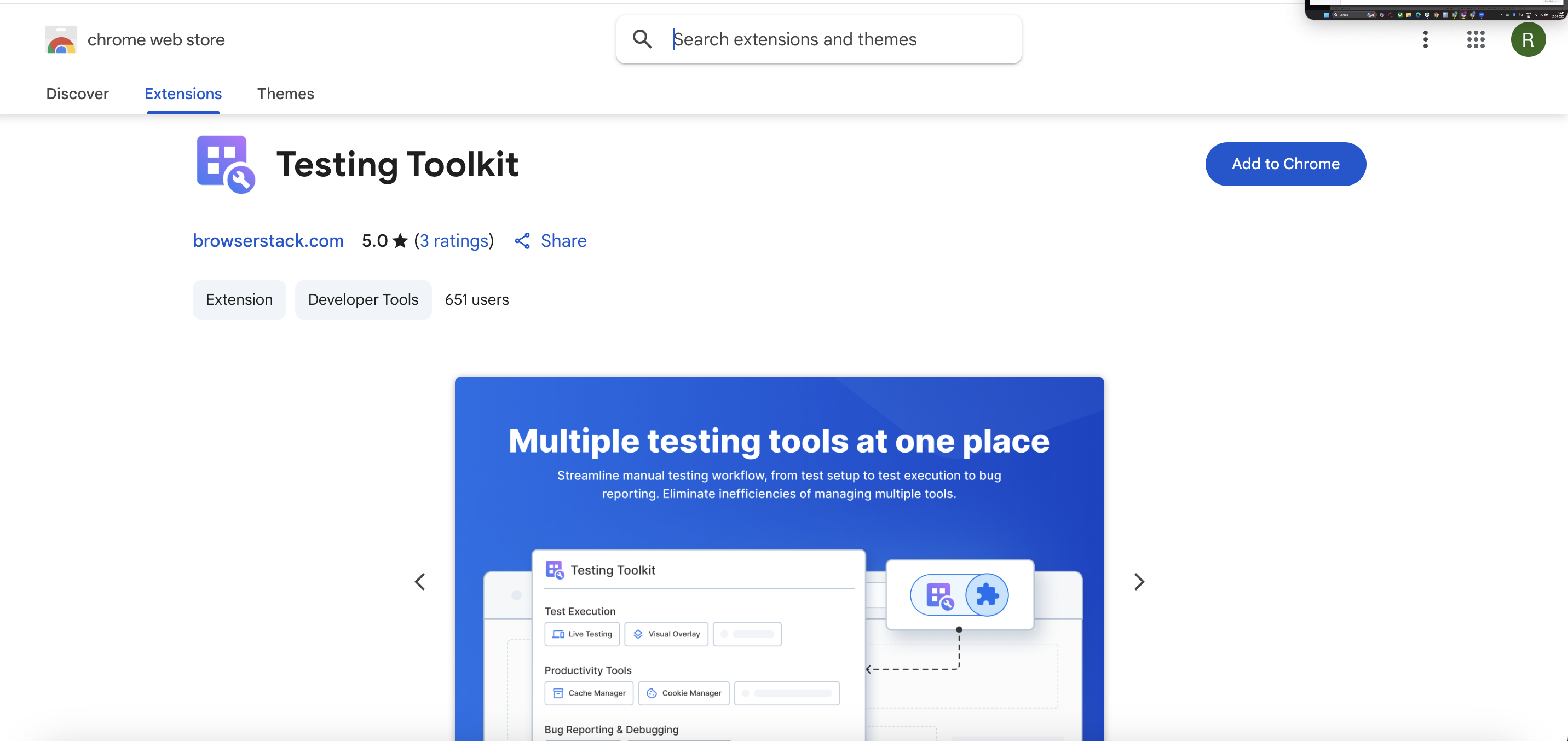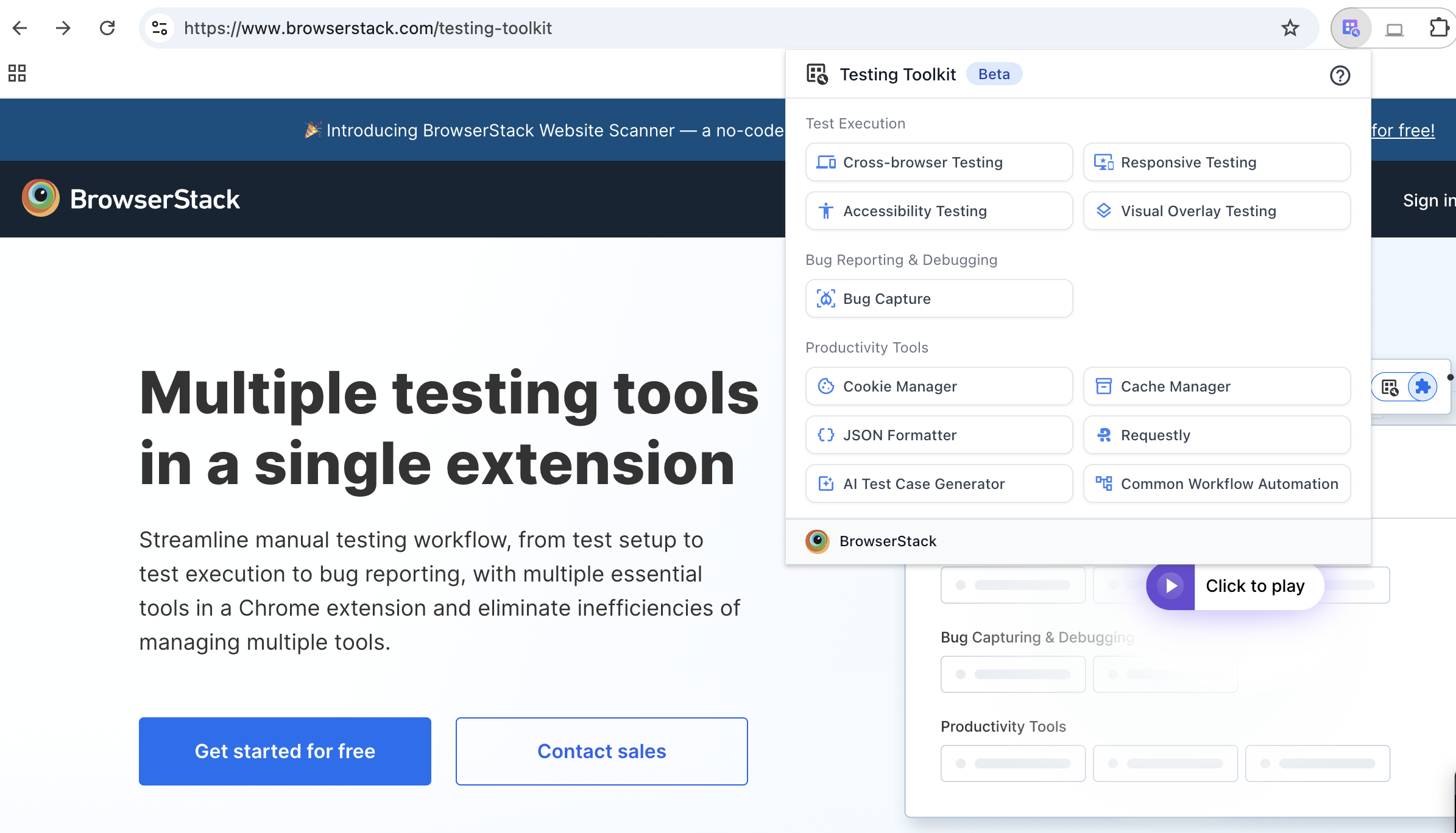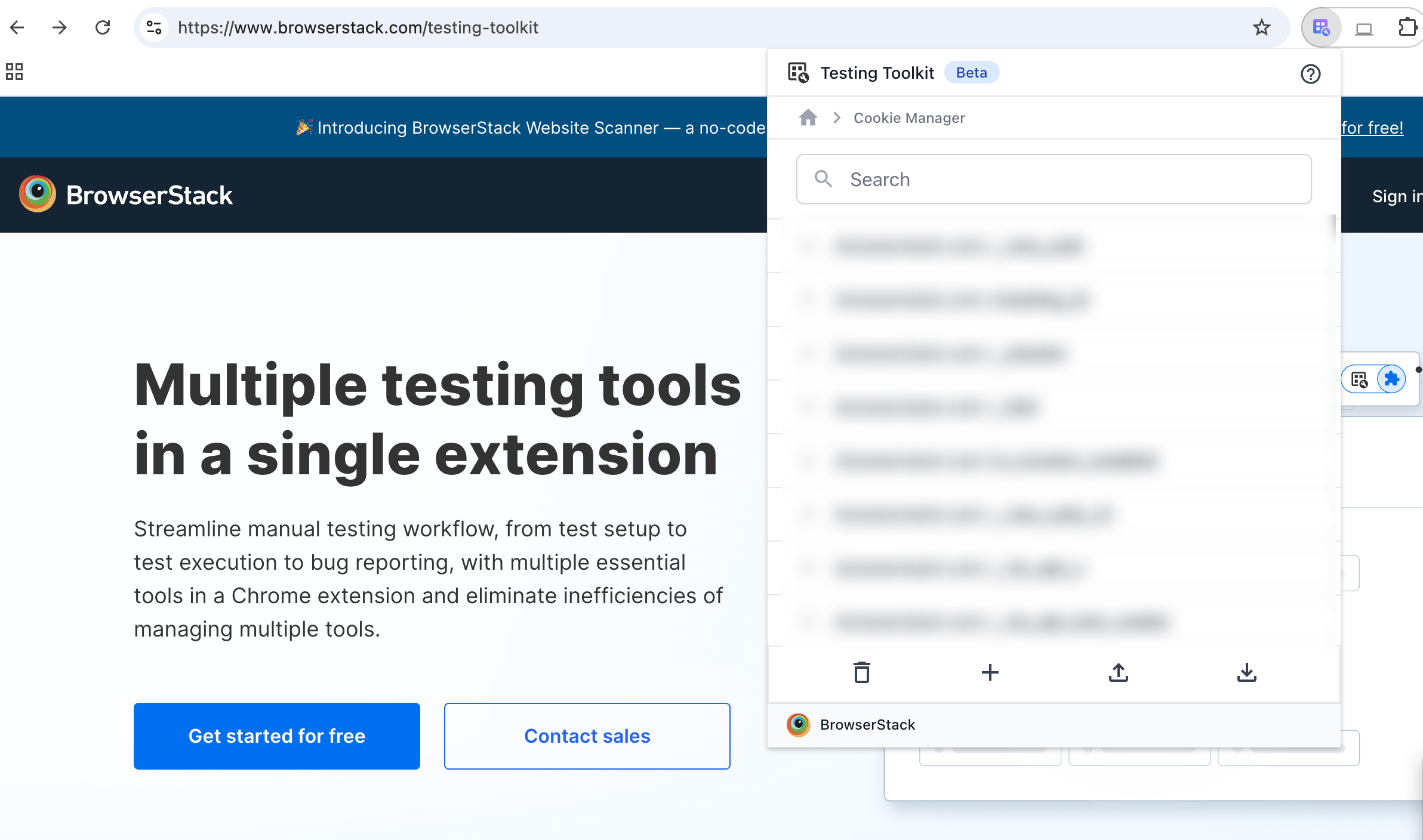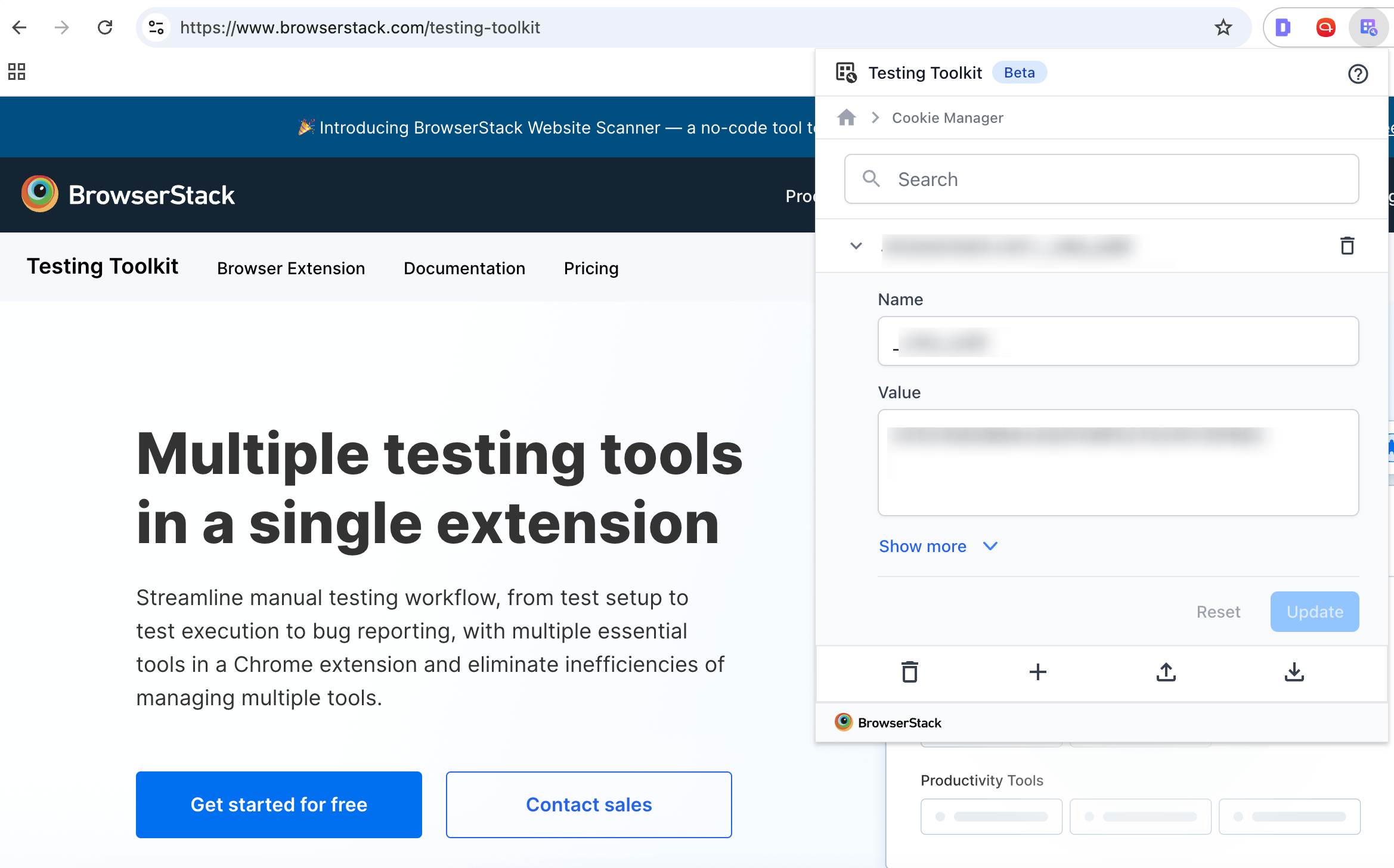BrowserStack Cookie Manager
Cookie-related issues, such as expired sessions, login glitches, or leftover test data, often disrupt the accuracy and flow of web testing. Without proper cookie control, testers may struggle to maintain clean environments or replicate real user behavior.
A cookie manager helps maintain clean sessions, replicate user scenarios accurately, and speed up the debugging process during testing.
What is a Cookie Manager?
Cookies are small text files stored in a user’s browser by websites to remember information such as login credentials, user preferences, session states, and tracking data.
They help provide a seamless and personalized browsing experience, enabling websites to recognize users across visits or maintain stateful interactions like shopping carts or logged-in sessions.
A cookie manager is a tool that allows users to view, edit, delete, and manage cookies within the browser. It allows developers and testers to inspect cookie data, troubleshoot issues like session timeouts or incorrect user states, and maintain clean test environments.
By using a cookie manager, teams can replicate real-world scenarios, debug authentication flows, and ensure that cookies behave as expected across different stages of the web application.
Types of Cookie Managers
Cookie managers come in various forms, each offering different levels of control and functionality depending on the user’s needs. Below are the most common types:
1. Built-in Browser Cookie Managers
Most modern browsers like Chrome, Firefox, Safari, and Edge include basic cookie management tools. These are accessible through browser settings or developer tools and allow users to view, clear, or block cookies for individual sites or all websites.
2. Browser Extensions
Third-party extensions like EditThisCookie, Cookie Quick Manager, or Cookie AutoDelete provide more advanced capabilities. These tools often include features such as auto-deletion of unwanted cookies, cookie editing, and export/import functions, which are especially useful for developers and testers.
3. Platform-Specific Cookie Managers
Testing platforms and automation tools sometimes include built-in cookie managers tailored for QA workflows. These tools enable users to manage cookies in live test sessions or during automated test execution without switching environments.
4. Developer Tools and Frameworks
Certain development frameworks and debugging tools offer cookie control as part of their utilities. These are typically used in staging or dev environments to simulate different user sessions or to test how cookies behave under various conditions.
Each type of cookie manager serves a different purpose, ranging from everyday browsing privacy to detailed testing and debugging in professional development workflows.
Why Cookie Management Matters
Cookies are crucial in maintaining session continuity, storing user preferences, and enabling authentication flows across web applications. However, if not appropriately managed, cookies can lead to various issues that affect both user experience and test reliability.
In testing and development environments, unmanaged cookies can:
- Causes session conflicts, especially when switching between user roles or accounts
- Retain outdated data, leading to inconsistent test results
- Introduce security risks, such as unintended data persistence or exposure to tracking cookies
- Complicates debugging, especially in login flows or state-based scenarios
Effective cookie management ensures that testing is clean, consistent, and free from residual data that might interfere with results. It allows teams to simulate real-world user interactions accurately, reset sessions quickly, and maintain better control over application behavior across different environments.
Try BrowserStack Cookie Manager
Key Features of a Cookie Manager
A cookie manager offers a range of features designed to give users greater control over how cookies are stored, modified, and deleted. These capabilities are especially useful in web testing, development, and debugging. Here are the key features:
- View cookies stored by websites to inspect names, values, expiry dates, and domains
- Edit existing cookies to simulate different user states or authentication flows
- Delete specific cookies or clear all cookies to reset sessions and remove stale data
- Add new cookies manually to test how applications respond to specific values
- Block or allow cookies from specific domains to control storage behavior during testing
- Auto-delete cookies after sessions to maintain a clean testing environment
- Export and import cookie data to reuse sessions or share with team members
Benefits of Using a Cookie Manager
Using a cookie manager during web testing and development offers several advantages that help streamline workflows and improve accuracy:
- Maintain Clean Sessions: Quickly clear or reset cookies to avoid session conflicts and ensure fresh testing environments.
- Save Time in Testing: Modify or reuse cookies without repeating login steps or manual setup for each test.
- Improve Test Accuracy: Eliminate leftover or outdated cookies that could affect expected outcomes.
- Speed Up Debugging: Identify and resolve session or authentication issues more efficiently by managing cookies directly.
- Simulate Real User Scenarios: Manually add or edit cookies to mimic different user roles, states, or behaviors during testing.
- Enhance Privacy and Security: Block or remove tracking cookies to minimize unnecessary data exposure and comply with privacy standards.
- Increase Productivity: Import and export cookie sets to streamline repetitive testing tasks or share configurations across teams.
When to Use a Cookie Manager
A cookie manager proves especially useful in several testing and development scenarios, such as:
- Switching Between User Accounts: Easily clear or update cookies to test different user roles without logging in and out repeatedly.
- Testing Authentication Flows: Modify session or auth-related cookies to simulate login states and validate access control.
- Debugging Session Issues: Troubleshoot problems like unexpected logouts or stale sessions by inspecting and editing cookie data.
- Resetting Test Environments: Quickly delete cookies to ensure each test runs in a clean, isolated environment.
- Simulating Real-World Scenarios: Manually add cookies to replicate specific user conditions or device behaviors.
- Ensuring Privacy Compliance: Block or remove tracking cookies while testing to align with GDPR, CCPA, or other data regulations.
- Sharing Test Configurations: Export cookie sets for reuse across different environments or team members during collaborative testing.
Why use BrowserStack Cookie Manager?
BrowserStack Cookie Manager is a lightweight extension that lets you manage cookies directly within your active test session, without disrupting your workflow. It’s designed to help testers quickly inspect, edit, and control cookie data in real time.
- Manage Cookies Without Leaving the Test Page: Work with cookies directly within the current tab, no need to switch views or reload the session.
- View Cookies Instantly: See all cookies associated with the current browser tab in one place for quick inspection.
- Add New Cookies: Create cookies manually with custom attributes such as name, value, domain, and expiry to simulate specific conditions.
- Edit Existing Cookies: Update cookie details like value, domain, path, or expiration to test different user states or sessions.
- Delete Cookies Easily: Remove individual cookies or clear all cookies in a single click to reset sessions or troubleshoot issues.
- Real-Time Updates: See changes reflect immediately in the browser, no need to refresh the page manually.
Try BrowserStack Cookie Manager
How to use BrowserStack Cookie Manager?
BrowserStack Cookie Manager is easy to set up and use, making cookie management quick and seamless during live testing sessions. Follow the steps below to get started.
Add the Extension
- Visit the BrowserStack Testing Toolkit page
- Click on Get Started for Free
- You’ll be redirected to the Chrome Web Store page for the Testing Toolking extension that includes BrowserStack Cookie Manager
- Click Add to Chrome to install the extension in your browser
- Once added, pin the extension to your browser toolbar for quick access
Using the BrowserStack Cookie Manager
- Open the website you want to inspect or modify cookies for
- Click the Testing Toolkit icon in the Chrome toolbar
- Select Cookie Manager under the Productivity Tools section
- The Cookie Manager panel will display all cookies for the current domain
- Click Show more to view or edit cookie properties
This extension allows you to:
Delete Cookies
- Click the Delete icon to remove all cookies for the current domain
Add Cookies
- Click the plus (+) icon to add a new cookie
- Enter the Name and Value in the fields provided and click Add Cookie
Import Cookies
- Click the Import cookies icon
- Enter cookie details and click Import
Download Cookies
- Click the Download cookies icon
- Choose your preferred format: JSON, Header String, or Netscape
- Select Export as CSV or Copy to clipboard based on your need
Conclusion
Efficient cookie management is essential for accurate, reliable, and streamlined web testing. Whether you’re troubleshooting session issues, simulating user behavior, or resetting test environments, a cookie manager helps maintain full control over browser data.
Tools like the BrowserStack Cookie Manager simplify this process by offering a quick, user-friendly interface directly within your test sessions. This saves time and ensures cleaner, more consistent test results.

